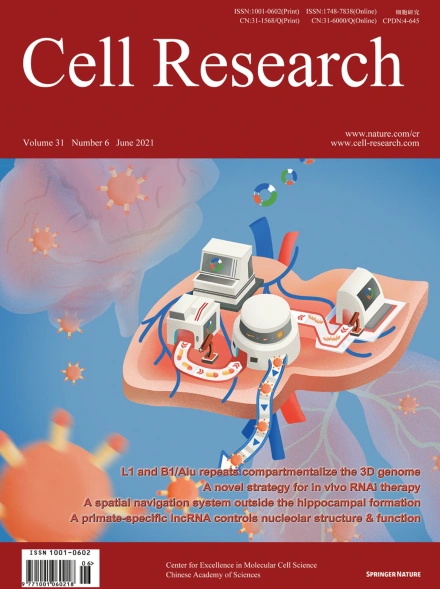
Advanced Search
Submit Manuscript
Advanced Search
Submit Manuscript
Volume 31, No 6, Jun 2021
ISSN: 1001-0602
EISSN: 1748-7838 2018
impact factor 17.848*
(Clarivate Analytics, 2019)
Volume 31 Issue 6, June 2021: 720-722
The basis of a more contagious 501Y.V1 variant of SARS-CoV-2
Haolin Liu1,2,* , Qianqian Zhang3 , Pengcheng Wei1,2 , Zhongzhou Chen3 , Katja Aviszus1,2 , John Yang4 , Walter Downing5 , Chengyu Jiang6 , Bo Liang7 , Lyndon Reynoso8 , Gregory P. Downey4 , Stephen K. Frankel4 , John Kappler1,2 , Philippa Marrack1,2,* , Gongyi Zhang1,2,*
1Department of Immunology and Genomic Medicine, National Jewish Health, Denver, CO 80206, USADear Editor,
The SARS-CoV-2 virus has infected over one hundred million people (COVID-19 patients) and caused more than two million deaths to date. The number of infected people continues to grow quickly, emphasizing the need for rapid use of effective vaccines. Although two mRNA vaccines based on Spike protein (produced by Pfizer-BioNTech and MODERNA) have been approved for emergency use in the US,1,2 the increasing Spike variants that have appeared around the world raise concerns about the continued efficacy of the vaccines.3 Monoclonal antibodies, developed by Regeneron and Eli Lilly, specifically targeting the native form of Spike have been approved by the FDA for emergency use.4,5 An N501Y variant (Y501) of the Spike protein of SARS-CoV-2 (B.1.1.7, 20I/501Y.V1), first emerged in UK and has now spread to the rest of the world. This variant appears to be much more contagious than the original N501 version.3 Furthermore, Y501 mutation is also found in a variant (B.1.351, 20H/501Y.V2) from South Africa and a variant (P1, 20J/501Y.V3) from Brazil.3 Unfortunately, this mutation is located at the interaction surface between the RBD and human Angiotensin Converting Enzyme 2 (ACE2).6 Thus, the Y501 variation present in B.1.1.7, 20I/501Y.V1 might affect the binding ability of the RBD to bind ACE2. We therefore compared the binding affinity of N501 and Y501 RBD for ACE2, uncovering that the affinity for ACE2 of the Y501-RBD was ~10 fold higher than that of the N501 version. This may account, at least in part, for the greater infectivity of SARS-CoV-2 with this mutation. Structural modeling data showed that Y501-RBD can form an additional aromatic ring–ring interaction and an additional hydrogen bond with ACE2 by comparison with the RBD of the wild type. In spite of this, sera from individuals immunized with the Pfizer-BioNTech vaccine still efficiently block ACE2 binding to Y501-RBD. Furthermore, Bamlanivimab, the recently FDA approved therapeutic antibody drug for treatment of COVID-19 patients4 still binds the variant Y501-RBD as efficiently as it binds the N501-RBD, giving hope that treatment with the existing monoclonal antibodies may still help COVID-19 patients.
https://doi.org/10.1038/s41422-021-00496-8